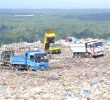By TYRONE A. VELEZ
Davao Today
Government says Mindanao’s energy crisis will be gone by 2015; but their solution to use coal-fired power plants worries environment advocates.
Energy Secretary Carlos Petilla presented to the 22nd Mindanao Business Conference that coal power is the fastest and most stable way to provide energy supply.
He announced that two coal powered plants are under construction in Mindanao and will begin operation by mid-2015, the 300-megawatts (MW) Therma South coal-fired plant in the boundary of Davao City and Sta. Cruz, Davao del Sur owned by Aboitiz Power, and the 200-MW Sarangani coal power plant of Sarangani Energy Corporation in Maasim, Sarangani owned by the Dominguez family.
He further said three other projects are underway such as the 15-MW Diesel Power Plant by Mapalad Energy Generating Corporation in Mapalad, Dalipuga, Iligan City; the 15-MW HFO Peaking Plant by EEI Power Corporation in Magdum, Tagum City, and the 300-MW Mindanao 3 Geothermal Plant in Kidapawan, North Cotabato.
The five power projects would produce 580 MW according to the Mindanao Power Monitoring Committee (MPMC) headed by Mindanao Development Authority (MinDA).
The MPMC also projected that by 2020, Mindanao’s dependence on hydro-power plants will be reduced to 24% from 56% this year, with coal-powered plants providing more than half of the island’s power capacity.
Juland Suazo, spokesperson of the environment group Panalipdan criticized the government’s switch from renewable energy to coal-powered plants.
“With greater coal power comes increased electricity rates like what happened in Luzon and Visayas,” Suazo explained.
“The reason why Mindanao has cheaper rates compared to Luzon and Visayas is because we use renewable energy from Agus-Pulangi hydropower plants,” he added.
Suazo said the better option is to rehabilitate the Agus Pulangi plant to boost its capacity to supply power for the regions.
Petilla, however, pitched for private investments in coal, citing that hydro-power discourages investors because of the low price of 2.90 pesos per kilowatt-hour (KW/h) as compared to coal which can provide 400 MW selling at 4 pesos per KWh.
Dr. Jean Lindo of the Network Opposed to Coal (NO TO Coal )Davao said the social cost on health matters with the pollution caused by coal-powered plants. “Coal power plant owners would not spend for the health impact their plants will bring to Davao,” she warned.
“Well if they want economics, there is more sustainable economics in clean energy. Besides, people don’t need to spend more on hospitalization from the harmful effects of coal,” she added.
Greenpeace considered coal the “biggest industrial contributors to microscopic particulate pollution”, citing studies on the effects of coal-powered plants and found acid gas, soot and dust emissions contribute hugely to pollution. Its effects are increased risks in heart attacks, lung cancer, asthma and other respiratory problems.
Suazo also added “It is a repeated flimsy alibi of the (administration) that renewable energy is expensive and cannot provide baseload. The long years of service of Agus-Pulangi hydropower plants disproved the claim that renewable energy is unstable and expensive.”
Suazo also criticized Aquino who launched on 2011 the National Renewable Energy Plan (NREP) but is now pushing for what he calls “dirty energy” of coal-fired power plants with contracts granted through private-public partnership.
Last February, Aquino granted various coal mining contracts to Altura Mining for 3 areas in Catanduanes; Consunji-led Semirara Mining Corp for 9 areas in Oriental Mindoro and Sarangani; Empire Asia for Surigao del Sur, and SKI Mining for Agusan del Sur and Surigao del Sur.
Petilla explained that the government will still pursue renewable energy projects such as mini and micro-hyro plants and solar energy but wants to be sure that cooperatives have stable leadership and collection measures.
To this, Suazo refuted, saying “What’s unstable is the government’s political will not to provide us with clean, renewable and affordable energy.” (Tyrone A. Velez/davaotoday.com)
Aboitiz Power Corporation, Agus-Pulangi, blackouts, coal, coal fired power plant, Energy, green energy, Mindanao, Sarangani Energy









